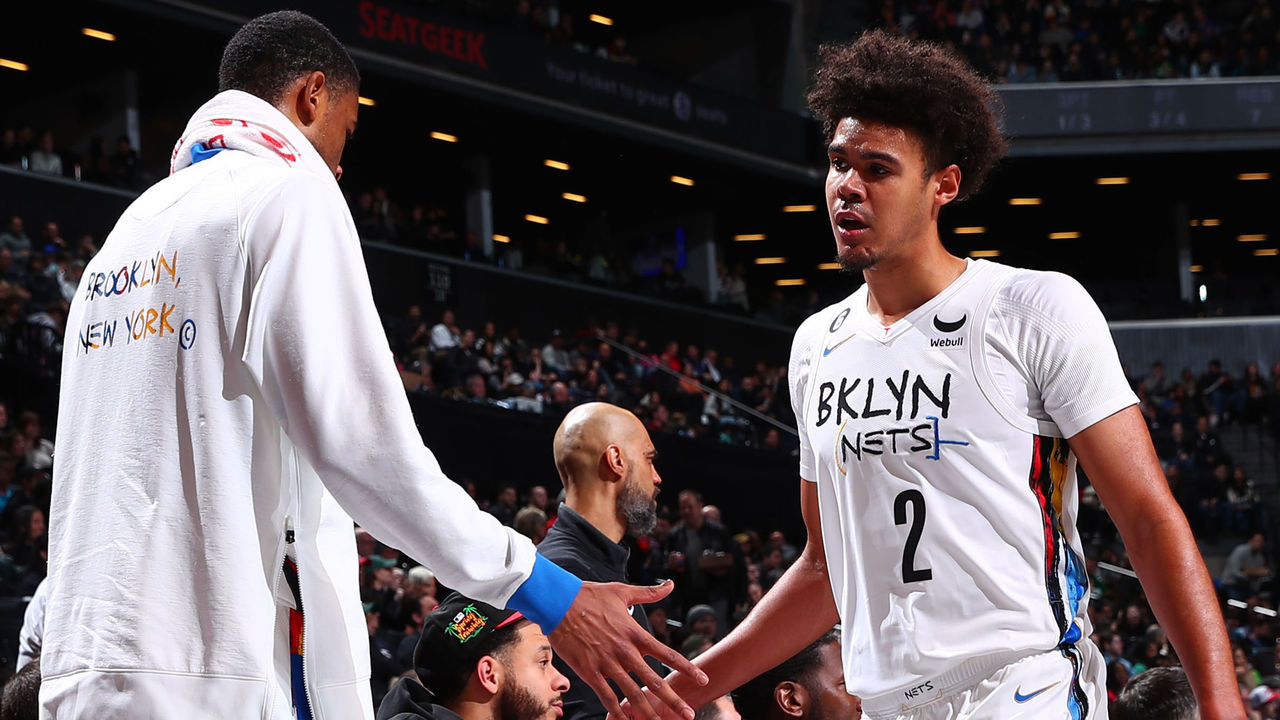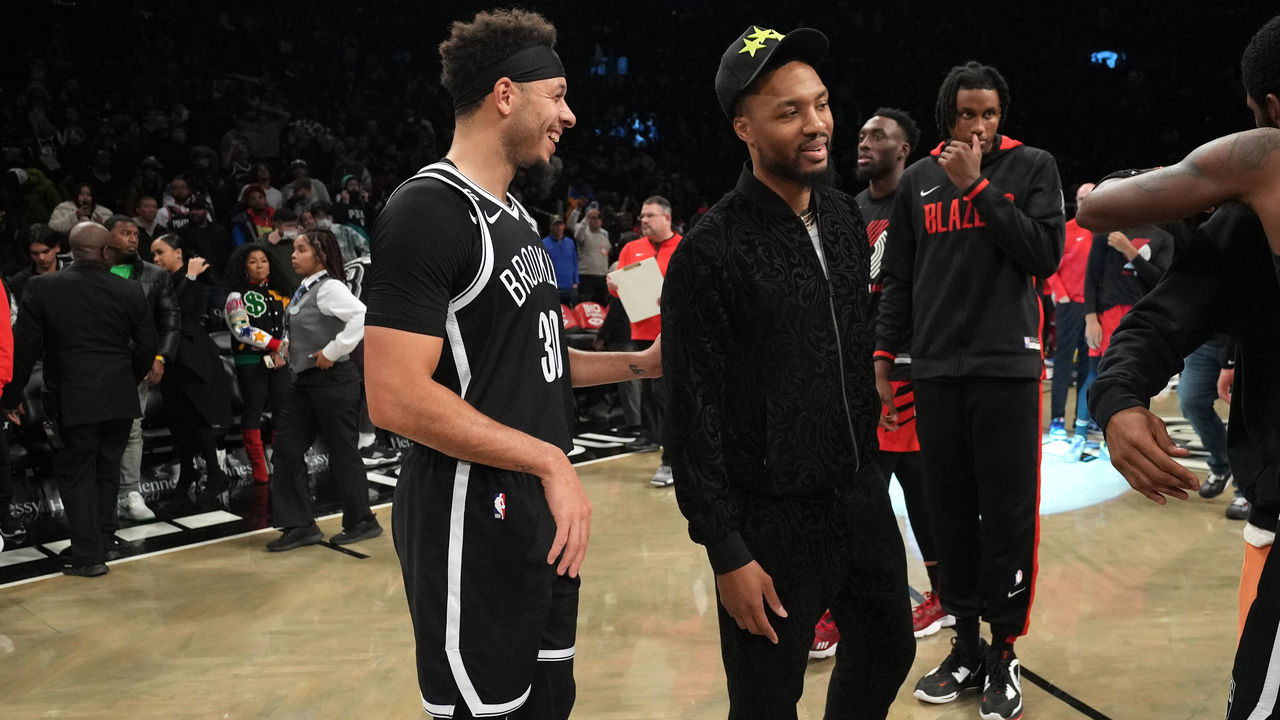After trading Durant and Irving, are Nets primed to land another star?
When the Brooklyn Nets traded Kevin Durant, the 13-time All-Star became perhaps the greatest player ever moved midseason. Naturally, much of the discussion stemming from that deadline-week blockbuster has focused on Durant's new team in Phoenix rather than the Nets squad he left behind.
The Suns added one of the best hoopers of his generation to a team already boasting Devin Booker and Chris Paul, instantly becoming Western Conference favorites. Meanwhile, the Nets were on the losing end of a deal that included a superstar days after trading Kyrie Irving.
Durant's Suns and Irving's Mavericks are now structured to vie for Western Conference supremacy, but Brooklyn remains an almost equally fascinating team. By trading their two stars, the Nets have set themselves up to … land another star.
From the Durant and Irving deals, the Nets acquired Mikal Bridges, Cam Johnson, Spencer Dinwiddie, Dorian Finney-Smith, unprotected Suns first-rounders in 2023, 2025, 2027, and 2029, a first-round pick swap with Phoenix in 2028, an unprotected Mavericks first-rounder in 2029, and second-round Mavs picks in 2027 and 2029. They also took Jae Crowder off the Suns' hands, then re-routed the disgruntled veteran to Milwaukee to snag a couple of extra second-round picks.
It's enough to leave you breathless.

The massive deals left Brooklyn without the type of top-tier talent required to contend, but head coach Jacque Vaughn has the luxury of a versatile roster that runs 12 players deep with legitimate rotation-caliber talent. The team could use a traditional center to bang with the league's biggest bodies down low, but the new-look Nets otherwise boast an enviable combination of shooting, length, and defensive upside.
The Nets have dropped 11 of their last 18 games, a stretch that saw Brooklyn lose Durant to a knee injury before he and Irving were traded. But at 34-24, and in fifth place in the Eastern Conference heading into the All-Star break, the Nets should remain competitive enough to reach the postseason. According to the most reputable projection systems, the Nets only need to win 10 or 11 of their final 24 games to directly qualify for the playoffs as a top-six seed, while a mere four or five wins should be enough to guarantee at least a play-in game.
The Nets also now have a promising collection of young talent, with Bridges and sharpshooter Johnson joining 23-year-old Defensive Player of the Year candidate Nic Claxton and 21-year-old Cam Thomas, a sophomore guard who recently exploded for 134 points over a three-game span.
Bridges' development might be the biggest swing factor for the team's current core. The durable 26-year-old grew into one of the league's most consistent two-way players over his four-and-a-half years in Phoenix. As a 3-and-D wing who can take on the toughest defensive assignments, Bridges is very much a glue guy on any contender. But for at least the remainder of this season, the star-less Nets are better equipped to find out if Bridges can be more than that.
"I think he's really underrated," Nets general manager Sean Marks told reporters following the trade with Phoenix. "I look forward to watching him kind of explode here, to be brutally honest."
Less than a week after Marks' comments, Bridges erupted for a career-high 45 points on 17-of-24 shooting in a home victory over the Heat; just his third game with Brooklyn.
If Nets fans close their eyes, it almost feels like 2019 again. Brooklyn has a fun, competitive, energetic group that would serve as the perfect supporting cast for a game-changing star. Now they just need to find one.
Employing desirable players on good contracts helps. Bridges, Thomas, and Finney-Smith are all locked up through at least 2025, while that trio plus Claxton will combine to earn just $46 million next season.
Johnson will be a restricted free agent this summer following the expiration of his rookie-scale contract, and Claxton can hit unrestricted free agency in 2024. But the only bad contract on Brooklyn's books belongs to Ben Simmons ($78.1 million remaining over the next two years). The Nets took on that albatross when James Harden was shipped to Philadelphia a year into the Harden-Durant-Irving experiment - a deal that also saw Brooklyn acquire draft capital from the 76ers.
If the biggest trades of the last year have taught us anything, it's that if you want to trade for a star - especially one with multiple years remaining on his contract - you need a lot of draft picks. Over the last eight months, Durant, Donovan Mitchell, Rudy Gobert, and Dejounte Murray have been moved in deals that saw Phoenix, Cleveland, Minnesota, and Atlanta surrender a combined 14 first-round picks (3.5 per deal), with an additional five first-round pick swaps included (1.25 per deal).
Luckily for the Nets, after trading Durant, Irving, and Harden over the last 12 months, Brooklyn now owns 11 first-round picks over the next seven years (seven of which it fully controls). In addition, many of those first-rounders present potentially tantalizing value as star cores in Phoenix and Dallas age or fizzle out.
Usually when a team stocked with young talent and picks signals a reset by trading its best players, the safe assumption is that it's going to build through the draft and find a way to tank to the bottom. That would make the team a very unrealistic landing spot for the next disgruntled superstar, but the Nets are in a unique position with their draft capital.
Of all those first-rounders in Brooklyn's possession, very few of them are the Nets' own picks, as the team traded away a plethora to acquire Harden from Houston in 2021. In fact, the Nets don't fully control their own first-rounder again until 2028. That leaves tanking off the table since Brooklyn's place in the standings over the next few years will have little effect on its draft positioning (though boosting its 2023 odds could help, since last-place Houston is unlikely to swap).
In short, a team in the league's biggest market is armed with depth, tradable contracts, a solid stable of young talent, excess draft capital, and an incentive to remain competitive for the next half-decade. If that rare combination doesn't scream star-trade candidate, nothing does.
As the Nets regroup in the wake of a dramatic and dysfunctional four years, Marks and the front office won't be in any rush to sell the franchise's soul as they did for Irving and Durant. If the right deal for an impact player doesn't materialize, Brooklyn could ride out the next couple of seasons until the team opens up cap space in 2025, when a who's who of genuine superstars can hit the free-agent market (included among them: Giannis Antetokounmpo, Jayson Tatum, Brandon Ingram, Jamal Murray, and Mitchell, who reportedly wanted to play for the Nets' intracity rivals before Cleveland acquired him).
The prospect of adding a player without giving anything up in return makes free agency preferable to trades, but teams also have less control over the former than the latter. Not to mention, a lucrative new media rights deal is set to kick in for the 2025-26 season. Even if the increased revenue is smoothed into the salary cap over multiple years, the influx of cash would still make more teams than usual flush with cap flexibility in the summer of 2025, creating greater competition in free agency.
If Brooklyn craves a more immediate acquisition, the Nets would have to go the trade route, and if Damian Lillard ever decides a capped-out play-in team (at best) in Portland is a grind worth running from, the Nets should be considered a threat to pounce.

Despite his commitment to the Trail Blazers, Lillard presents an obvious answer for those who speculate about which NBA star might be the next to force his way out of town. But less obvious candidates will emerge, too. They always do, and when that next surprising star hits the trade market, the Nets should be in the running for his services.
If you really want to let your imagination run wild, what if things go horribly wrong in Phoenix or Dallas? If the Suns and Mavs fail to get over the hump, and one of Devin Booker or Luka Doncic gets restless after Durant, Chris Paul, and Irving leave them stranded in a lose-lose situation with few ways for their teams to improve, how ironic would it be if Brooklyn comes knocking? Among the treasure trove of assets the Nets would have to surrender, they could offer the Suns or Mavs their own draft picks back.
That dreamy scenario is merely a hypothetical, and one that would take years to develop. For now, the Nets find themselves in position to quickly pivot from one star era to another.
For their sake, here's hoping it goes better than the last one did.
Joseph Casciaro is theScore's senior content producer.
HEADLINES
- Report: NBA mulls anti-tanking measures including draft tweaks
- Wizards' Whitmore out indefinitely with deep vein thrombosis
- Draymond leaves for locker room after heated exchange with Kerr
- Pelicans overcome AD's 35-point night to win 5th straight game
- Pacers' Carlisle wants NBA to review play that injured Jackson